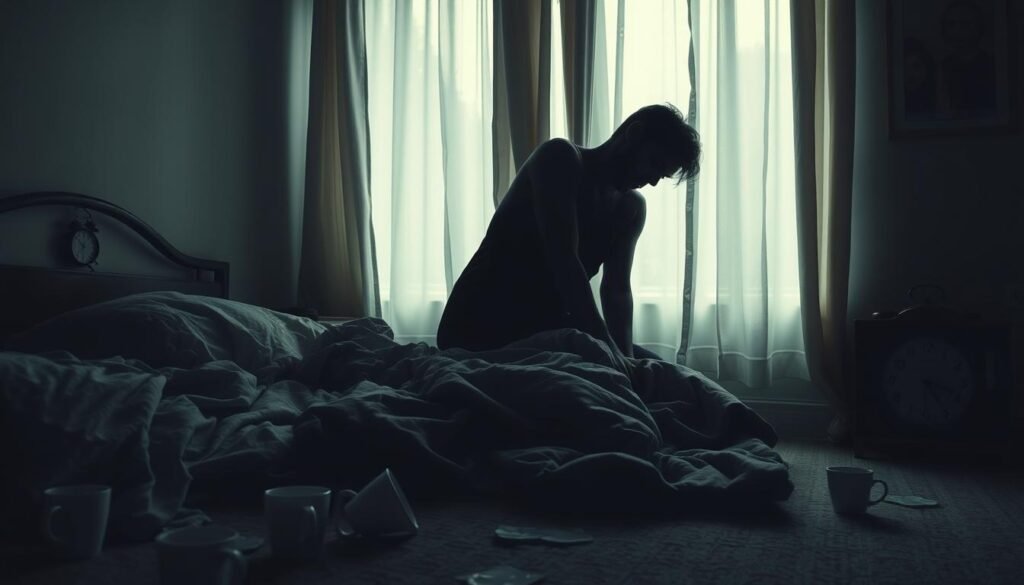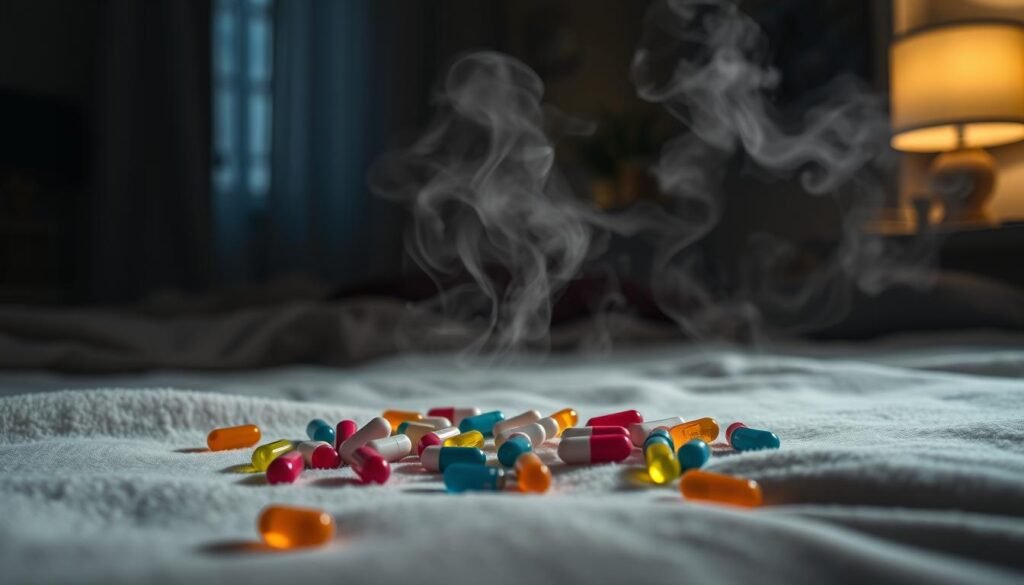Did you know fatigue is a common symptom in those with Major Depressive Disorder (MDD)? Over 90% of people with MDD feel extremely tired. This tiredness can make everyday tasks hard. Despite treatment, up to one-third of MDD patients still deal with fatigue. This shows depression’s effects go beyond just feeling sad.
Depression-related fatigue isn’t just about feeling physically tired. It includes having a hard time thinking clearly and feeling emotionally exhausted. Knowing how depression causes fatigue is important. It helps improve mental and overall health. For more on how your surroundings impact your mental health, check this article out.
Key Takeaways
- Fatigue affects more than 90% of individuals diagnosed with Major Depressive Disorder.
- Up to one-third of MDD patients experience fatigue even after treatment.
- Understanding the different forms of depression fatigue can aid in managing symptoms effectively.
- Good sleep hygiene and regular exercise are vital strategies for reducing fatigue.
- Consulting with a healthcare provider can help address persistent fatigue linked to depression.
Understanding Depression and Fatigue
Over 16 million adults in the United States struggle with depression. This mental health issue often comes with chronic tiredness, known as depression fatigue. It makes treating depression harder. Those with this condition feel sad and lose interest in things they once enjoyed. This leads to severe tiredness, making everyday tasks harder.
This link between fatigue and depression forms a harmful cycle. As tiredness grows, depression gets worse, leading to deeper feelings of hopelessness. Studies show over 90% of people with major depressive disorder (MDD) face extreme fatigue. This shows how common fatigue is among those with depression.
Many factors cause depression fatigue. Sleep problems are frequent, with some sleeping too little or not finding restorative sleep. Low dopamine levels also play a role, leading to fatigue due to chemical changes in the body. Thus, treating both depression and its fatigue is key.
Understanding this cycle helps in finding the right treatment. Cognitive-behavioral therapy is one effective method, showing success in 40% to 70% of cases. Lifestyle changes also help in fighting depression fatigue. Staying active, sleeping well, and eating right provide needed support for those affected.
Symptoms of Depression Fatigue
People with low energy depression face many symptoms. They can be physical, mental, or emotional. Knowing these symptoms helps manage depression and fatigue.
Physical Symptoms
Some physical symptoms include:
- Feeling extremely tired even with enough sleep
- Headaches, cramps, and upset stomach
- Feeling weak or heavy
- Problems with sleeping too much or not enough
These issues can cause a lot of depressive disorder lethargy. They affect daily life and happiness.
Cognitive Symptoms
Thinking problems come with physical symptoms. People may have:
- Trouble focusing and remembering
- Feeling confused
- Hard time making decisions
It’s hard to tell the difference between chronic fatigue and depression because of these symptoms. Both can make you really tired even if you rest a lot. To learn how they’re different, you can check this resource.
Emotional Symptoms
It’s key to notice emotional symptoms too. Symptoms include:
- Feeling unmotivated
- Getting easily annoyed
- Not finding joy in fun activities
These feelings make the cycle of fatigue worse. People want to be social but feel too tired because of depressive disorder lethargy. It’s important to address these problems to get better.
What is Depression Exhaustion?
Depression fatigue, often called depression exhaustion, is more intense than just feeling tired. It drains your energy and motivation deeply. This makes simple tasks very hard, such as getting up or making food.
It affects you physically and emotionally, taking away the pleasure in favorite activities. People with this problem may feel guilty and alone. This deepens their struggle. This leads us to question if depression can make you tired. Indeed, it’s a key part of understanding this illness and its impact.
About one in ten people will deal with depression in their life. Over 90% of those with it experience deep tiredness. Issues like bipolar disorder, seasonal affective disorder (SAD), or big life stress can make this worse.
The Link Between Depression and Sleep Problems
Depression and sleep problems often go together, making things hard for affected people. Having insomnia or hypersomnia is common in those with depression. About 75% of depressed individuals struggle to fall or stay asleep. This affects their overall well-being deeply.
Those with insomnia might face a much higher chance of getting depressed. Moreover, about 40% of insomniacs could have clinical depression. Depression can also lead to sleep apnea, increasing insomnia risk fivefold.
Treating depression and sleep problems together is key. Combining Cognitive Behavioral Therapy for Insomnia (CBT-I) with depression treatments helps a lot. It can improve sleep and lower depression relapse chances.
Practicing good habits is crucial. Keeping a regular sleep time, avoiding long naps, and reducing alcohol helps both sleep and mood. For teens, lack of sleep might cause irritability, hurting their school work and happiness.
It’s important to spot the link between depression and sleep issues early. Catching symptoms early leads to better lifestyle changes and help. This can mean a return to good sleep habits. For more tips on spotting depression early, check out this resource.
Can Depression Make You Tired? Exploring the Question
Many wonder if depression can cause tiredness. The answer is clearly yes. The reason behind this lies in the complex bond between depression and fatigue. These conditions impact a huge number of people. Biological and psychological elements both play a role in creating this type of exhaustion. If you have depression, your brain might struggle to manage energy properly. This struggle can make you feel very tired, not just physically.
Depression does more than just make you feel sad. It also makes you feel incredibly tired. Even after sleeping well, you might still feel drained. This goes beyond normal tiredness and is known as depression exhaustion. For many dealing with depression, chronic fatigue is also a real problem. This makes treating and healing even harder.
To tackle this, a thorough strategy is needed. After all, our minds and bodies are connected. Knowing that depression can lead to serious tiredness is the first step. Awareness of depression exhaustion helps. It guides those affected and their families towards the right support and care. This knowledge is key for anyone figuring out these challenges.
Physical Symptoms of Depression Fatigue

Depression fatigue has a big effect on life because of low energy. People often feel chronic pain like headaches and sore muscles. These pains stop them from doing normal activities.
Being tired is common and hard to shake off, even with enough rest. This makes people feel heavy and struggle in social or work settings. It shows how low energy depression hurts our health.
Also, depression often causes stomach issues. People might feel nauseous or have an upset stomach. It even changes how much they eat, leading to weight loss or gain.
- Chronic pain can manifest as:
- Headaches
- Back pain
- Muscle aches
- Joint pain
- Chest pain
- Common digestive issues include:
- Queasiness
- Nausea
- Diarrhea
- Constipation
- Loss of appetite or overeating
Treating these symptoms needs a careful plan. Therapy and medicine help with both the mental and physical sides of depression. Cognitive-behavioral therapy is good for learning how to deal with chronic pain.
In short, it’s important to know about the physical signs of depression fatigue. These signs affect how people with depression feel overall. This is why getting the right help is critical.
| Physical Symptoms | Description |
|---|---|
| Chronic Pain | Includes headaches, back pain, muscle aches, joint pain, and chest pain. |
| Fatigue | Feeling of tiredness, even after adequate sleep. |
| Digestive Issues | Nausea, queasiness, diarrhea, constipation, appetite fluctuations. |
| Dizziness | Feeling lightheaded or unsteady occasionally. |
Cognitive Symptoms of Depression Fatigue
Cognitive symptoms of depression fatigue affect daily life deeply. Many find it hard to concentrate and remember things. Simple tasks become hard to do. This makes decision-making tough, leaving people overwhelmed by easy choices.
Research highlights that over 90% of people with major depression report cognitive fatigue. Thoughts slow down, becoming hard to understand. People might pause, unsure of how to continue. This is closely linked with a lack of motivation depression, reducing the will to do daily activities.
Cognitive fatigue harms work and social life. Trouble focusing can cause missed deadlines and problems with friends and family. It not only affects success but also makes depression worse.
| Cognitive Symptoms | Impact on Daily Life |
|---|---|
| Reduced concentration | Difficulty completing tasks |
| Slowed thought processes | Delays in decision-making |
| Memory difficulties | Challenges in recalling information |
| Feeling mentally fatigued | Lack of interest in activities |
| Increased procrastination | Missed deadlines and responsibilities |
To lessen these cognitive symptoms, try mindfulness like meditation. These methods help clear the mind and fight lack of motivation depression. Recognizing and dealing with these symptoms is key to improving well-being in those with depression fatigue.
The Emotional Toll: Apathy and Lack of Motivation Depression

Depression affects people by lowering their interest in activities they once loved. This lack of enthusiasm can make the world seem less colorful. It often leads people to feel stuck in a cycle of hopelessness.
When someone feels apathetic, it’s harder for them to reach out for help or connect with others. This can make the path to recovery seem longer and harder. Finding ways to address these feelings is key to getting better.
Reports show that apathy is common in many mental health issues. For example, 70% of those with dementia experience a significant drop in interest. This shows how closely mental health and feelings of disconnection are linked. Managing these feelings is crucial to avoid worsening the sense of isolation.
Noticing signs of apathy early can lead to seeking help for deeper issues, like depression. Signs include not reacting emotionally, struggling to focus, thinking slowly, and having trouble with daily choices. To manage these signs, strategies may involve:
- Social engagement and interaction
- Participation in previously enjoyed activities
- Art or music therapy
- Regular physical exercise
- Breaking tasks into smaller, manageable segments
- Implementing self-reward systems
- Ensuring adequate sleep
- Joining support groups
Highlighting the importance of spotting apathy in depression sufferers is crucial. It opens up discussions on getting treatment and support. Professional help could be a key step in finding the motivation again and lifting the heavy emotional burden of depression.
Causes of Depression-Related Fatigue
Knowing why depression leads to fatigue is key for those feeling constantly tired. Many who are depressed report feeling very tired all the time. This greatly affects how they handle daily life.
One big reason is trouble sleeping. Depressed people often take longer to fall asleep and sleep less overall. This worsens their tiredness during the day.
What you eat matters too; bad nutrition can make you feel more tired. Antidepressants might also add to the problem. That’s why talking to doctors about any energy drops is important.
Constant stress is another part of the problem. When dealing with mental illness, keeping up with daily life can be exhausting. This is where the “Spoon Theory” comes in. It explains how simple tasks can use up your energy quickly.
It’s also essential to rule out health issues like hypothyroidism, anemia, or chronic fatigue syndrome. These can look a lot like depression. A doctor can help figure out exactly what’s wrong and how to fix it.
In severe cases, someone might need more help, like staying at a treatment center. This can help them manage their depression and the tiredness that comes with it. It’s important to understand these issues deeply to take good care of your mental health.
How Medications Impact Depression and Energy Levels

Antidepressants can make you feel tired. This can make it hard to keep your energy up when you’re being treated for depression. Some drugs for depression, like amitriptyline, can make you sleepy. Others, like SSRIs and SNRIs, might also make you feel tired.
How awake or sleepy you feel can be affected by how certain medicines work with your brain chemicals. Some common meds that might make you feel tired are:
- Antihistamines
- Anxiolytics like benzodiazepines (e.g., alprazolam)
- Beta-blockers (e.g., atenolol)
- Opioid pain relievers (e.g., morphine, oxycodone)
- Anticonvulsants for epilepsy
- Some cancer and gut medications
Sometimes, other side effects from antidepressants, like nausea, sleep issues, or adding weight, can also make you feel tired. These usually get better after a few weeks as your body gets used to the medicine. But, some antidepressants might mess up your sleep schedule. This can make it hard to sleep well, which makes you tired during the day. Learning more about how medicines work together can really help.
To fight tiredness from medicine, try exercising, deep breathing, or talking to your doctor for advice. Sometimes, changing your medicine or getting a new one can help with tiredness and make you feel more awake.
Coping Strategies for Managing Depression Fatigue
Dealing with depression fatigue might seem hard, but there are many ways to feel better. Using certain techniques can make you feel more energized and less tired. It’s possible to feel a big change in your energy and mood.
Exercising is a great way to fight off depression symptoms. Studies show that doing 30 minutes of exercise every day can work as well as medicine. Activities like walking, swimming, or dancing raise your mood and energy. Even a short 10-minute walk can make you feel better for a couple of hours.
Eating well is very important for your mental health. A diet with lots of lean proteins, veggies, and grains helps you feel good. Drinking enough water and not too much alcohol can also reduce feeling mentally tired.
Getting good sleep is key to beating depression fatigue. This means going to bed at the same time every night, having a comfy sleeping area, and not using screens before bed. Better sleep means you’ll have more energy during the day.
It’s important to get help if you’re dealing with depression fatigue. Therapy offers special strategies and support groups let you share with others. Having friends and people to talk to helps you not feel alone with your depression.
Self-care like mindfulness, writing in a journal, and doing things you enjoy also help with depression fatigue. Being thankful and helping others improve your mental health, giving you purpose.
| Strategies | Benefits |
|---|---|
| Regular Exercise | Boosts energy levels and alleviates depressive symptoms |
| Balanced Diet | Supports mood improvement and enhances overall health |
| Good Sleep Hygiene | Improves rest and restores energy |
| Professional Help | Provides tailored coping strategies and emotional support |
| Mindfulness Activities | Reduces stress and promotes a sense of well-being |
| Social Engagement | Fosters connections and feelings of belonging |
| Gratitude Practices | Enhances mood by focusing on positive aspects of life |
Using these strategies can help you feel mentally clearer and more stable. Trying different methods can empower you to handle your mental health better.
Consulting a Doctor: The Importance of Professional Help
Seeing a doctor for depression fatigue is an important step to getting better. In the U.S., around 17.3 million adults deal with severe depression. It’s crucial to understand your symptoms. This knowledge helps tell the difference between medical conditions and mental health issues.
A doctor or psychiatrist can give you a complete check-up and a treatment plan just for you. This is key because depression treatments can vary. They may include therapy, changes in medicine, or other personalized methods.
More than 90% of people with major depressive disorder feel very tired. About 75% also find it hard to sleep well. Getting professional help can make a big difference. Keeping a mood diary can also help. It allows you to share your experiences and track improvements.
If you’re facing a crisis, it’s critical to get help right away. You can go to the nearest emergency room or call a crisis hotline. Asking for help when you need it is a brave and important step.
| Type of Professional | Services Offered | Prescribes Medication |
|---|---|---|
| General Practitioners (GPs) | Routine assessments and medication | Yes |
| Psychiatrists | Psychotherapy and medication management | Yes |
| Psychologists | Therapy and counseling | No |
| Counselors | Supportive therapy | No |
| Social Workers | Community resources and support | No |
| Psychiatric Nurses | Support and medication management | Yes |
Getting help from professionals is crucial in handling depression and fatigue right. It’s important to talk about physical symptoms. This can help you get the right treatment and improve your life.
Conclusion
Understanding how depression and fatigue are linked is key to managing and getting better. About 90% of people with major depressive disorder feel very tired. It’s important to see this as a sign of what they’re going through. Close to 97% feel a huge drop in energy, showing why it’s crucial to focus on this problem.
People dealing with mental health tiredness need to get the right diagnosis. They should look into treatments that help both mind and body. Doing regular exercise, sleeping well, and practicing mindfulness can really help. These steps have been proven to cut down tiredness and make moods better, letting people take back control over their lives.
Spreading the word about how complicated fatigue in depression is helps people fight the constant tiredness. By fully understanding their issue and finding the right help, those suffering can get their energy back. They can enjoy life more. This turns fatigue from a big problem into something they can handle on their mental health journey.